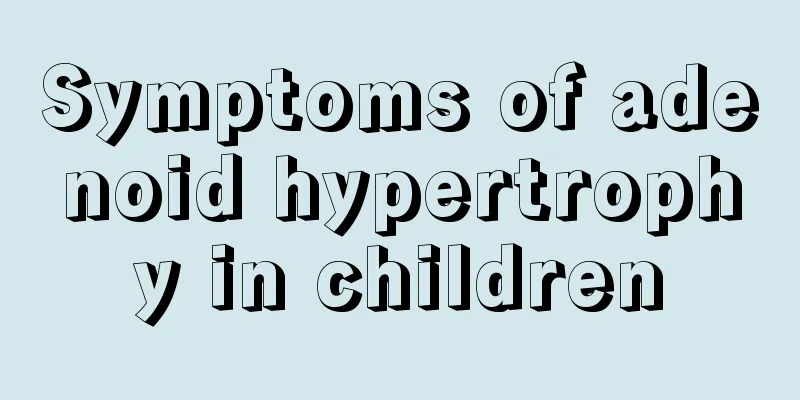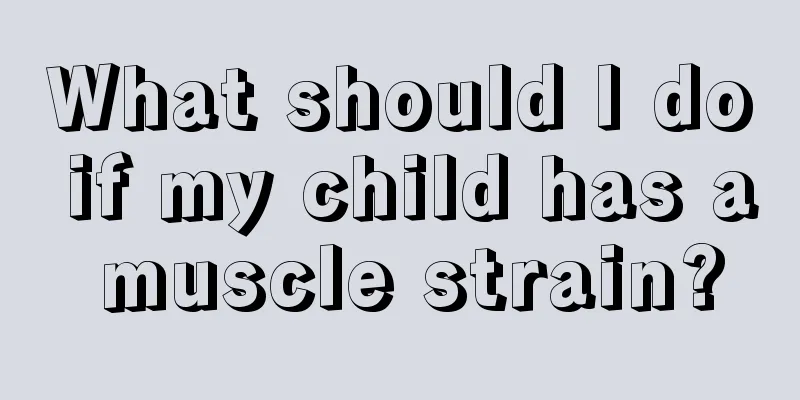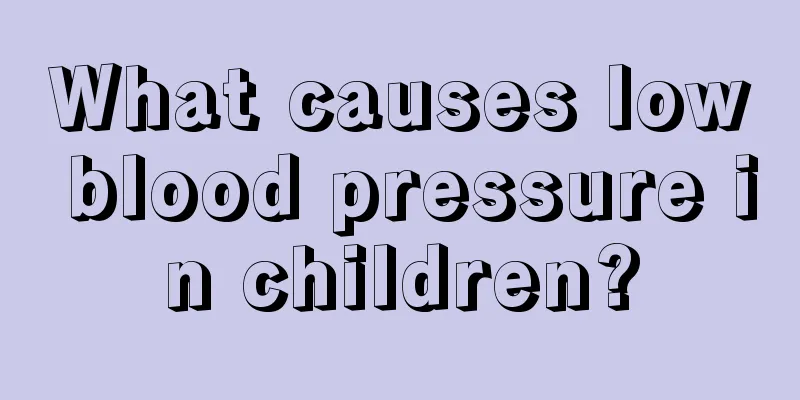Symptoms of adenoid hypertrophy in children

|
When it comes to adenoids hypertrophy, many people are familiar with it. Children are very likely to suffer from this disease. The treatment of adenoids hypertrophy in children should be based on the patient's specific situation, which is very helpful in alleviating the disease. However, when treating adenoids hypertrophy, it is also necessary to understand the manifestations of adenoids hypertrophy. Many people are not very clear about the manifestations of this disease. The following is a detailed introduction so that the treatment of adenoids hypertrophy can be carried out correctly. Symptoms of adenoid hypertrophy in children: Systemic symptoms The overall development and nutritional status are poor, and the children show symptoms of anorexia, vomiting, indigestion, and subsequent malnutrition. Poor breathing and insufficient lung expansion may lead to chest deformity. Poor breathing at night will cause children to be in a state of hypoxia for a long time, which will disrupt endocrine function and cause growth and development disorders. Parents may find that their children have symptoms such as inattention, mood swings, night terrors, teeth grinding, night sweats, bedwetting, enuresis and slow reaction. In addition, long-term airway obstruction and insufficient lung ventilation will lead to increased pulmonary artery pressure, and in severe cases, right heart failure. Adenoid hypertrophy is one of the most common causes of obstructive sleep apnea-hypopnea syndrome (OSAHS). Loud snoring and breath holding during sleep are the two main symptoms. Mouth breathing during sleep, excessive sweating, morning headaches, daytime sleepiness, and learning difficulties are also common symptoms. Main hazards Prone to "adenoid facies" Since children's nasopharynx is relatively narrow, when the adenoids are enlarged, they have to breathe through their mouths due to nasal congestion that affects their breathing. Long-term mouth breathing, the airflow impacting the hard palate will cause the hard palate to deform and arch. Over time, the face will develop out of shape, with a short, thick and upturned upper lip, drooping mandible, disappearance of the nasolabial groove, a high and arched hard palate, uneven teeth, protruding upper incisors, poor bite, a flat and curved nasal septum, etc. The facial muscles are not easy to move and lack expression. This is medically called "adenoid facies." Susceptible to tracheitis Enlarged adenoids in children can cause nasal congestion, causing the child's nasal mucus to flow back into the pharynx, irritating the lower respiratory tract mucosa, often causing bouts of coughing, and making the child more susceptible to bronchitis. It can easily cause children to become depressed and slow to react. If children breathe through their mouths and have blocked noses for a long time, it is easy to cause ischemia and hypoxia in the head, resulting in mental depression, headache, dizziness, memory loss, slow reaction, etc. Affects children's growth and development Since children need a lot of oxygen to develop, snoring will cause children to suffer from severe hypoxia during sleep, which will directly lead to insufficient oxygen supply for brain development and cause a decrease in the secretion of growth hormone. This will not only affect the child's height, but also reduce the body's resistance, and will also affect the child's future intelligence. After understanding the symptoms of adenoids hypertrophy, it is necessary to improve the disease in a timely manner. In addition, any abnormal conditions that occur during the treatment process must be reported in a timely manner. This will help the patient's disease. At the same time, if the patient feels uncomfortable during the treatment process, he or she also needs to choose some improvement methods. |
<<: What to do if your child has enlarged adenoids
>>: Conservative treatment of adenoid hypertrophy in children
Recommend
What happens if there is yellow mucus in the child’s eyes?
It is usually normal for people to have eye mucus...
What to do if your child has blackheads on his face
In fact, everyone knows that children's skin ...
Introduction to baby fever and cold hands and feet
When a baby has a fever and has cold hands and fe...
How to treat papular dermatitis in children?
Many mothers have had this experience: when their...
Rheumatic fever in children, early signs and symptoms
Rheumatic fever in children is prone to recurring...
What causes children not to eat?
If the baby does not eat, it will be detrimental ...
What does hot lungs look like?
Heat rash is a very common disease. In fact, heat...
How to treat infantile hemangioma?
In recent years, hemangiomas in infants and young...
What to do if your baby spits up after eating milk powder
Babies need to make the transition from drinking ...
Treatment for a two-year-old baby's cough at night
We all know that many people have experienced cou...
3 major hazards caused by baby powder
Some mothers, after bathing their babies, will ap...
When do newborns' tear glands open?
When a newborn baby is born, some of its organs a...
How much does a three-year-old child grow in height every month in spring?
Children are the most precious treasures of their...
How does a baby's heart beat?
Only when the heart beats normally can we live an...
Can children eat watermelon if they have a cough?
Children's coughing is a common phenomenon in...









